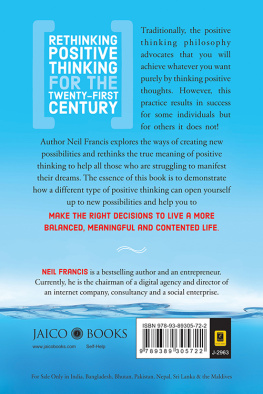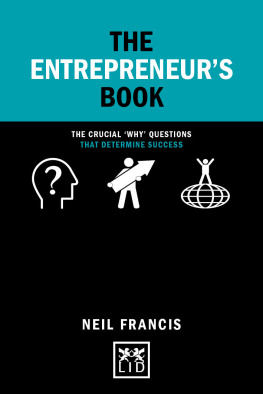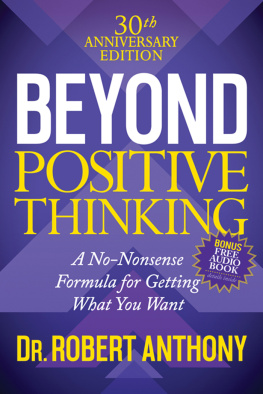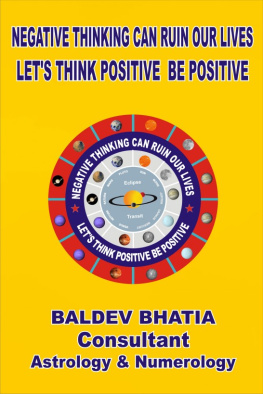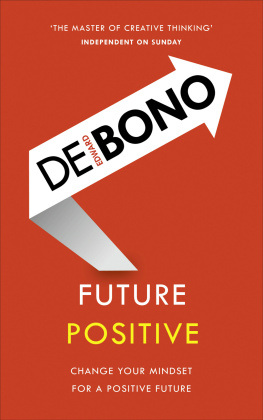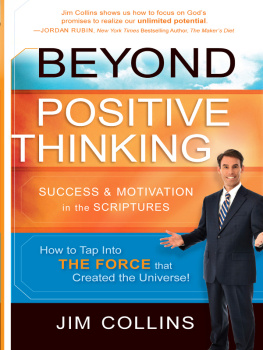
Published by Jaico Publishing House
A-2 Jash Chambers, 7-A Sir Phirozshah Mehta Road
Fort, Mumbai - 400 001
www.Jaicobooks.com
2019 Neil Francis
Published in arrangement with
LID Publishing Limited
The Record Hall, Unit 304
16-16A Baldwins Gardens
EC1N 7RJ, London, UK
To be sold only in India, Bangladesh, Bhutan,
Pakistan, Nepal, Sri Lanka and the Maldives.
POSITIVE THINKING
ISBN 978-93-89305-72-2
First Jaico Impression: 2022
No part of this book may be reproduced or utilized in
any form or by any means, electronic or
mechanical including photocopying, recording or by any
information storage and retrieval system,
without permission in writing from the publishers.
Contents
- Chapter 1 Accepting your now
Acceptance - Chapter 2 Discovering meaning
Purpose - Chapter 3 Developing a growth mindset
Mindset - Chapter 4 The importance of optimism
Optimism - Chapter 5 The power of strengths
Strengths - Chapter 6 Making choices
Choices - Chapter 7 Benefits of gratitude
Gratitude - Chapter 8 Coping with difficult issues
Negativity - Chapter 9 The good things about failure
Failure - Chapter 10 Increase your resilience
Resilience
- Chapter 11 Wearing your values
Values - Chapter 12 Using your imagination
Imagination - Chapter 13 Sharing your dreams
Dreaming - Chapter 14 Open up your creative mind
Creativity - Chapter 15 Identifying your goals
Goals - Chapter 16 Embracing who you are
Identity - Chapter 17 The outcomes of positive emotions
Emotions
ABOUT
THE AUTHOR
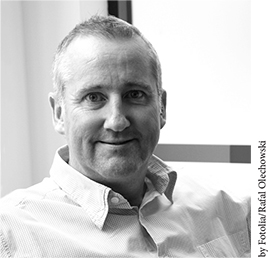
Neil Francis is the author of The Entrepreneurs Book and Changing Course . He is currently the chairman of a digital agency, director of one internet company, director of a consultancy practice and a trustee of a social enterprise. At the age of 41, he suffered a stroke that led him to discover a new, meaningful and rewarding life, which led Neil to publish three books and work with many inspiring CEOs, leaders, charity bosses and entrepreneurs.
www.neil-francis.com
neil@neil-francis.com
Acknowledgments
Well, this is book three and, as ever, I have had so many people helping me.
So, massive thanks go to:
Fiona Maciver and Helen McGillivray, who read the first draft of the manuscript.
Steve Dalgleish, Becca Henderson, Kari Spence and Rachel Woods for allowing me to share their remarkable stories.
My long-suffering GPs, Dr Claire Doldon and Dr
Gabriele Salucci! Dr David Gillespie, my neuropsychologist, and all the brilliant doctors, nurses and speech therapists in the NHS who have helped me in so many ways to recover from my stroke.
The fantastic team at LID Publishing, especially Sara Taheri, Martin Liu, Caroline Li, Susan Furber and Sue Littleford.
As always, my daft golden retrievers Dougal and Archie whose walks on the beaches of North Berwick gave me the perfect space to think and plan the book.
Jack, Lucy and Sam, who helped motivated me with their encouragement and love.
Finally, and most importantly, my lovely wife Louise, whose help and support made this book become a reality.
In memory of Becca Henderson.
A remarkable, brave and inspirational young woman.
To start, a story
to get you in
the right mood
for my book
In a village on the coast of Mexico, an American businessman was standing on the pier when a small boat with just one fisherman docked. Inside his boat were several large yellowfin tunas.
The American complimented the fisherman on the quality of his fish and asked him how long it took to catch them.
Only a little while, the Mexican fisherman replied.
The American then asked the man why he didnt stay out longer and catch more fish. The Mexican said that he caught enough to meet his familys needs.
But what do you do with the rest of your time? the American asked.
I sleep late, fish a little, play with my children, take a siesta with my wife, Maria. Each evening I stroll into the village, where I sip wine and play guitar with my amigos. I have a full and busy life, seor.
The American scoffed at this: Im a Harvard MBA and I could help you, he said. You should spend more time fishing, and with the proceeds, buy a bigger boat. With the proceeds from the bigger boat, you could buy several boats. Eventually, youd have a fleet of fishing boats, and instead of selling your catch to a middleman youd sell it directly to the processor.
Then you could open your own cannery. Youd control the product, processing and distribution. Youd need to leave this small fishing village and move to Mexico City, then on to Los Angeles, and, eventually, to New York City, where youd run your expanding enterprise.
But seor, how long would all this take? the fisherman asked.
Fifteen, maybe twenty years, the American replied.
But what then, seor?
The American laughed and said: Thats the best part. When the time is right, you would announce an IPO and sell your company stock to the public. Youd become very rich. Youd make millions!
Then what, seor?
Then youd retire. Move to a small fishing village on the coast, where youd sleep late, fish a little, play with your grandchildren, take a siesta with your wife. In the evening you could stroll to the village, sip wine and play guitar with your amigos.
INTRODUCTION
MY STROKE OF DISCOVERY
Lets start with a statement that might surprise you.
Having a significant stroke at age 41 turned out to be one of the most positive things that has ever happened to me.
Now, this might be a very strange thing to admit, and I can only say it 13 years on from my stroke. But it really has. It has opened up so many possibilities that I can honestly say would not have occurred if I had not had
the stroke.
But on 20 October 2006, when I was lying in the stroke ward of the hospital, unable to speak, with my memory in shreds and temporary blinded in my right eye, it was the worst thing that had ever happened to my family and me. For well over three years it was a very difficult and challenging time for everyone.
So how, you might ask, have I concluded that an event that was horrific initially has now become such a good thing in my life? This event and subsequent challenges have led me to finally understand the power of positive thinking and how to use it in my life. But this is a different type of positive thinking for the 21 st century. And used in the right way, I have found it has created many new possibilities in my life. In this book, I am going to share what this type of positive thinking consists of.
Common positive thinking philosophies that have permeated Western society for the last 75 years claim that mere visualization is the key to succeeding and achieving anything that you want. And that the only things that stop you from achieving happiness, good health and wealth are your negative thoughts and to succeed you must block or ignore them. This book will provide a different, better and more realistic understanding of positive thinking. But, before I describe the type of positive thinking that I am advocating, it will help to explore where the idea of thinking only positive thoughts and blanking out negative ones comes from, and why some of its core tenets are flawed.

